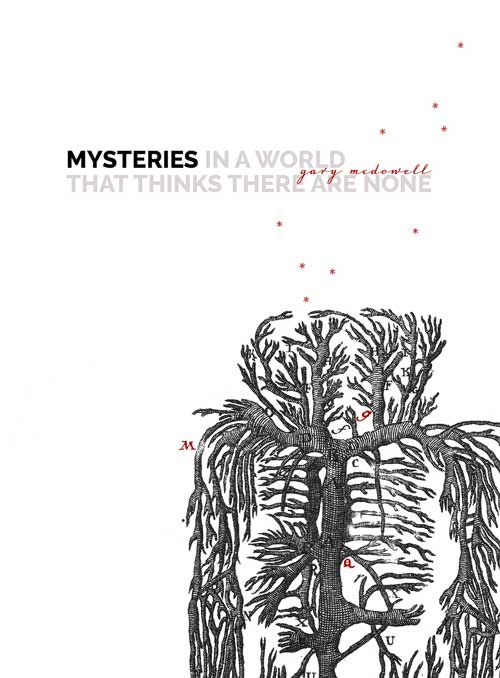
Mysteries in a World that Thinks There are None
Gary McDowell
2016
$12 (shipping included)
Gary McDowell is the author of five collections of poetry, including Mysteries in a World that Thinks There Are None (Burnside Review Press, 2016); Weeping at a Stranger’s Funeral (Dream Horse Press, 2014); and American Amen (Dream Horse Press, 2010), winner of the 2009 Orphic Prize in Poetry. He’s also the co-editor, with F. Daniel Rzicznek, of The Rose Metal Press Field Guide to Prose Poetry (Rose Metal Press, 2010). His poems and essays have appeared in The American Poetry Review, The Nation, Gulf Coast, New England Review, Prairie Schooner, and Colorado Review.; He lives with his family in Nashville, TN, where he’s an assistant professor of English at Belmont University.
“In Gary McDowell’s Mysteries in a World that Thinks There Are None to know the world is to know an object, to tell beak from jaw, to hold the skull in your hand and have it say homesickness. A fact is a thing of intimacy, and intimacy is made from obsession and bats hanging from the pylons like black grapes. These silhouettes are “the space between an image and its evidence”—the body Rorschaching every lit surface with stolen pears thrown to the pigs and an odd number of roses, thorns still on. Reading these poems, I am more than myself. I am etymology and egg, am the mysterious rabbit hole of fact, am as massive and tiny as a star. This book has the patience of a stone and the urgency of a library on fire. It is the prayer I wish could be written in cursive on God’s ear.”
—Traci Brimhall
"'Consciousness,' Gary McDowell writes, 'is an exile,' and indeed these poems speak to us from the margins of a darkly-brewed interiority. The self here is both sheltering and entrapping, and skeptical of the double-edged power of language to name and destroy. The predominant figure of speech here is the oxymoron, from the collection's title to its boggling, witty declarations: '(T)hat songbird has a beautiful voice, / and on the off chance it should / survive being swallowed, it's time / it learned the art of leaving.' This speaker is in love with the image—'the opera balcony you can fish from, milk-white snails big as campaign / buttons'—and in love with art, but his love doesn't let him off the hook, as he repents that he spends so much time 'with a book that weighs more / than (his) son.' I am grateful for the rare ferocity of this collection, its rejection of platitudes, its willingness to atone, and its acknowledgment of the trembling, mysterious ground we stand on."
—Diane Seuss
“Sometimes transcendent joy is sitting quietly and plainly in front of us. Or it arrives when we aren’t looking for it. We may look at it or ponder it and simply blink—the stunned heart, the stunned mind. An epiphany is one thing, but being present for the beauty and kindness to be found in the ordinary world is something else. And to feel such beauty and kindness may be seeking us, inviting our regard, is indeed a mystery. Poetry, or art of some form, is one of the few responses one can make. Prayer is another, followed by silence. The poems in this fine book eloquently reveal the everyday mysteries all around us, and make it plain that any response deepens the heart—and that becomes a further mystery.”
—Maurice Manning